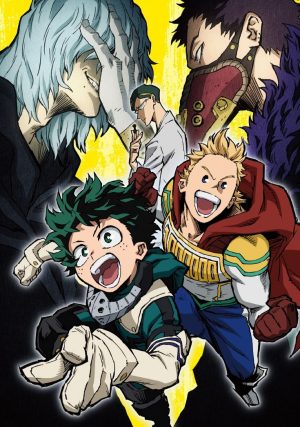
A New World, A New Semester
- Episodes : 25
- Genre : Action, Shounen, Comedy, Super Power, School
- Airing Date : October 12, 2019 – April 4, 2020
- Producers : Bones
After the events of season three, the fourth season—especially in its final act—emphasizes a post-All Might world. Before the season can get to explore that, our heroes must face a new threat, the Shie Hassaikai. They’re an organized crime organization that is exploiting the quirk of Eri, a little girl, to make bullets that can erase the quirks of a user. In the second act, the season focuses on the school life of UE students as they prepare for their school festival.
Why You Should Watch Boku no Hero Academia 4th Season (My Hero Academia 4)

1. Introduces Some Fresh Villains
For a majority of the series, the League of Villains have largely been the main baddies for Midoriya and his friends. For this season, they take a back seat and, this time, our heroes face the Shie Hassaikai, led by Overhaul. Forget the fact that he and his goons like to wear plague masks as a gimmick. What makes these guys even more sick than Tomura and the League of Villains is how they exploit Eri. While it’s not 100% portrayed, it is heavily implied that she is going through traumatic abuse and when Midoriya and Lemillion fail to save her the first time they meet her, they take their failures very hard.
In the second half, Midoriya faces Gentle Criminal. While he’s not as ambitious as your typical supervillain who wants to destroy society, he’s more of a Golden Age of comics villain (akin to let’s say the original Flash’s rogues gallery) by being more comedic.
2. Further Develops Characters
What this season does best is further develop its cast. Now with All Might officially retired, it really gives the series an opportunity to really see what the students of UE and remaining full-time heroes are truly made of. While Lemillion was introduced in season three, season four makes excellent use of him. By the time the series hits its climax, it also gives Endeavor his opportunity to finally develop in a well-rounded sense, too. As for Midoriya, not only do you get to see him further develop as a hero, but just as a human being as a whole. While his rivalry with Bakugo is also put on the back burner this season, Bakugo is given the opportunity to develop as an individual as well.
3. Effective Use of Downtime
After many action-oriented arcs, the second half once again returns to the school-oriented parts at UE. This time, you see the characters prepare for their annual school festival. This story arc once again reminds the audience that they’re still in school so they need opportunities to still be regular teenagers, too. This part of the season also reminds us (and the cast) that UE isn’t exclusively class 1-A, but there are other courses within the school as well. Most notably, the technical support class is given the opportunity to show how they can be of contribution.
Why You Should Skip Boku no Hero Academia 4th Season (My Hero Academia 4)
1. Full of Shounen Cliches
If you’re someone who doesn’t enjoy Dragon Ball Z, Naruto, One Piece, Bleach, or any other Shounen anime, then Boku no Hero Academia is obviously not for you. While it does have a unique gimmick by utilizing American concepts of superheroes, what it has to offer beneath the surface are all things that we have already seen before. Midoriya is the hardworking underdog, Bakugo is the naturally gifted rival, and All Might is that over dramatic hero we’ve all seen before, but uses his wisdom and experience to be a mentor. Just about EVERY trope you can think of in a Shounen title is more or less present in Boku no Hero Academia.
2. You Need to Watch the First Three Seasons
Boku no Hero Academia isn’t something you can easily just jump into midway through. You really have to start from the beginning. It’ll probably take a while to get to season four, but if you can muster 50+ episodes to get to where the series is presently, then you can get more out of it. While season four does contain its own unique stories, it is still conditional that you watch the first three seasons to understand how everything falls into place.
3. Full of School Anime Cliches
When it comes to school anime, events such as the annual school festival where the class does a song have also been done before (looking at you, Haruhi). While these episodes are based on real-life high school traditions in Japan, it’s still something that audiences of all backgrounds have seen again and again. Yes, there’s no denying that a superhero element does offer something distinct, but when it comes to what the function and purpose is, it’s still the same thing to remind audiences that such events are to remind us of the fragility of youth, not to take it for granted, etc.

The fourth season is excellently balanced with how it shares with the audience that it’s both an action and school anime. The stakes have now been raised and you get to see how the world reacts to the retirement of All Might. While the world takes it hard as new villains come from out of the woodwork, our heroes find a way to pull through. Thankfully, the last episode promises a fifth season and unless you haven’t read the manga, there’s a lot to look forward to. So, what do you guys say about season four? Leave your thoughts in the comments!
[ad_2]

